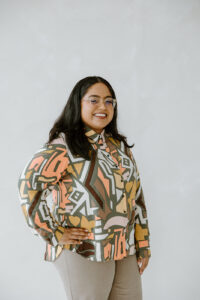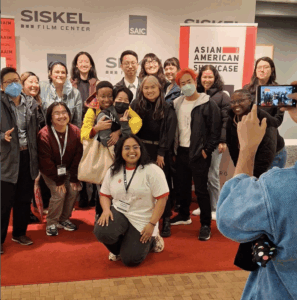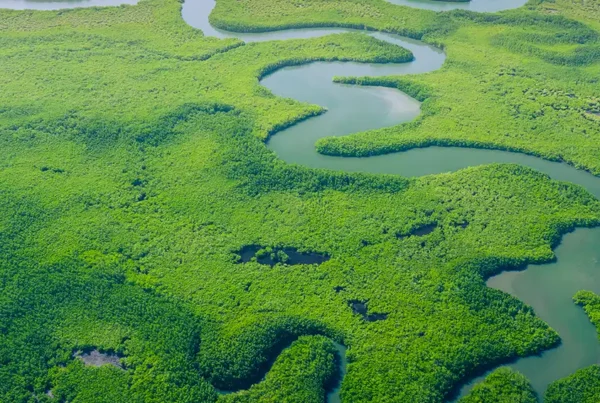The Frontline Resource Institute (FRI) is guided by a Conceptual Committee of 10 environmental justice leaders from around the world. This blog post is the first in a series that will introduce you to FRI’s Conceptual Committee members, their motivations and vision for engaging with FRI and the environmental and climate justice movement, and some of the important lessons they have learned in their professional and personal journeys.
Today’s blog features Lavannya Pulluveetil Barrera, an independent consultant based in Chicago, Illinois.
Provide an overview of your background and your professional work
I experienced a dramatic shift in my life when, in high school, my family moved to the suburbs of New Jersey. After spending so many years in New York City and northern New Jersey in the shadow of environmental racism, moving to an area where public access to green spaces and environmental education were priorities was a shock to my system. I realized that I wanted my future work to address these inequities in some way, so when I went to college, I majored in Environmental and Sustainability Science.
I started by working on conservation issues, then moved on to flood mitigation and food justice. After graduating, I shifted my focus more toward energy justice, first at Environmental Defense Fund (EDF) as a Tom Graff Diversity Fellow, then at Vote Solar, where I led the organization’s partnership, community engagement, and education efforts. More recently, I served as a Program Officer at the Climate and Clean Energy Equity Fund, overseeing grantmaking in the Midwest. Currently, I work as a freelance consultant partnering with organizations to improve community engagement, deliver educational workshops, and develop social impact programs.
What is your motivation to engage in the environmental and climate justice movement?

There is a collective and untapped desire among people to shift policy, imagination, and culture toward justice. It’s just a matter of reaching people where they already are, with resources, and in ways that resonate. That’s the work that excites me the most because I know that the fight for environmental and climate justice is a long one. We need everyone, and I am honored to be even a small part of someone’s journey.
What is your interest in engaging with FRI, and what is your vision for the organization?
FRI remains in its experimental phase, which works to its advantage. The organization is developing its identity through trial and error, and given the current political landscape, you could even say it’s trial by fire. Put another way, FRI has an incredible opportunity now to do things differently, not just in the environmental movement, but also in the corporate and philanthropy sectors, because it doesn’t fit neatly into just one box now. It’s an exciting time to try innovative approaches and fill gaps that other organizations may not have the flexibility or resources to respond to.
I’d love for FRI to build the relationships and credibility necessary within the climate justice movement to serve as a resource and a convener, bringing people together to exchange ideas, build power, and function as a catalyst for change. Another goal I have is that the organization recognizes and embraces other social justice movements that frontline communities are part of. Gender justice, reproductive justice, housing justice, and worker rights—these issues are interconnected and contribute to the environmental and climate justice impacts faced by frontline communities. I strongly believe, inspired by revolutionaries like Assata Shakur and Angela Davis, that our liberation is interconnected, and we can’t address just one issue in this work. Being aware of and learning from these interconnected struggles will only help us achieve our goals.
What are some lessons learned from your involvement in the environmental and climate justice movement that you would like to share?
We need to invest in frontline leadership. Frontline communities have and continue to be overlooked and underinvested in by mainstream environmental and climate justice movements. So, how do we address those harms, rebuild trust, take accountability, and move forward positively with frontline communities leading the way? Centering the voices and knowledge of frontline communities is how we will move forward through the climate crisis. We are no longer at the point of preventing catastrophic climate chaos; we are experiencing it right now. So, how do we learn from the experiences of frontline communities who have been living this firsthand and facing the most severe impacts?
What do you hope to see FRI accomplish in the next 10 years?
Ten years from now, I would love to see that FRI has made a substantial impact in developing a new generation of climate leaders and in meaningfully changing the lived experiences of frontline communities
FRI is still relatively young and is building the relationships it needs to do this work effectively. Building that trust will take a long time, but hopefully, in ten years, FRI will be an established name and a trusted resource for climate and environmental justice organizations, providing them with support and a sense of community. That would be a truly powerful testament to the impact of FRI and the values the organization strives to embody in the world.
Share a recent project you are proud of
I organize community events for the queer APIDA community of Chicago! In May, I helped curate and co-host a Queer Shorts Program as part of an annual Asian American Showcase in collaboration with The Foundation for Asian American Independent Media (FAAIM).




